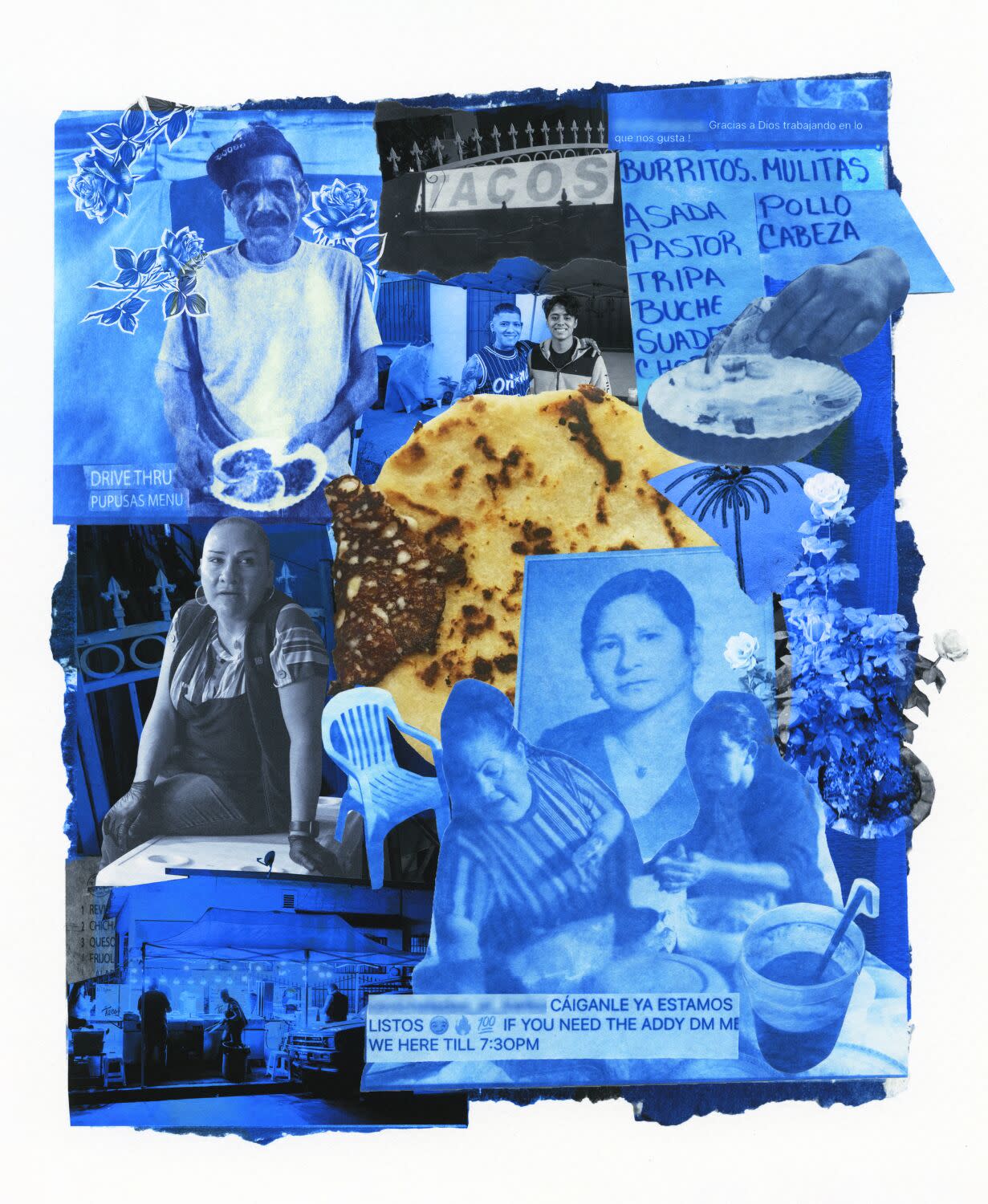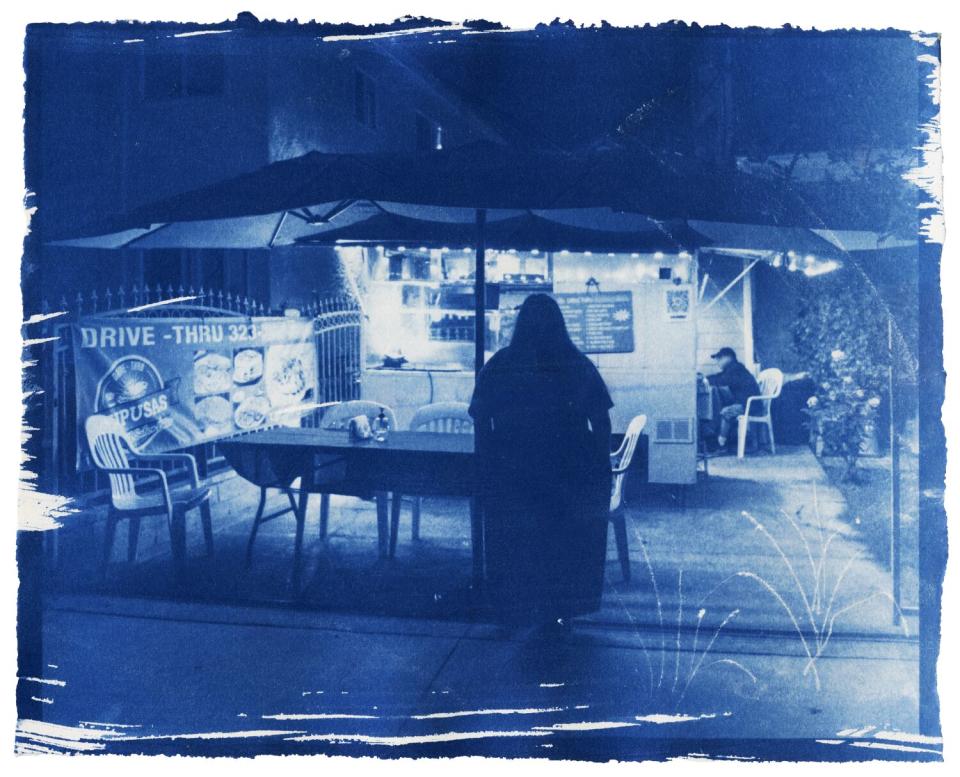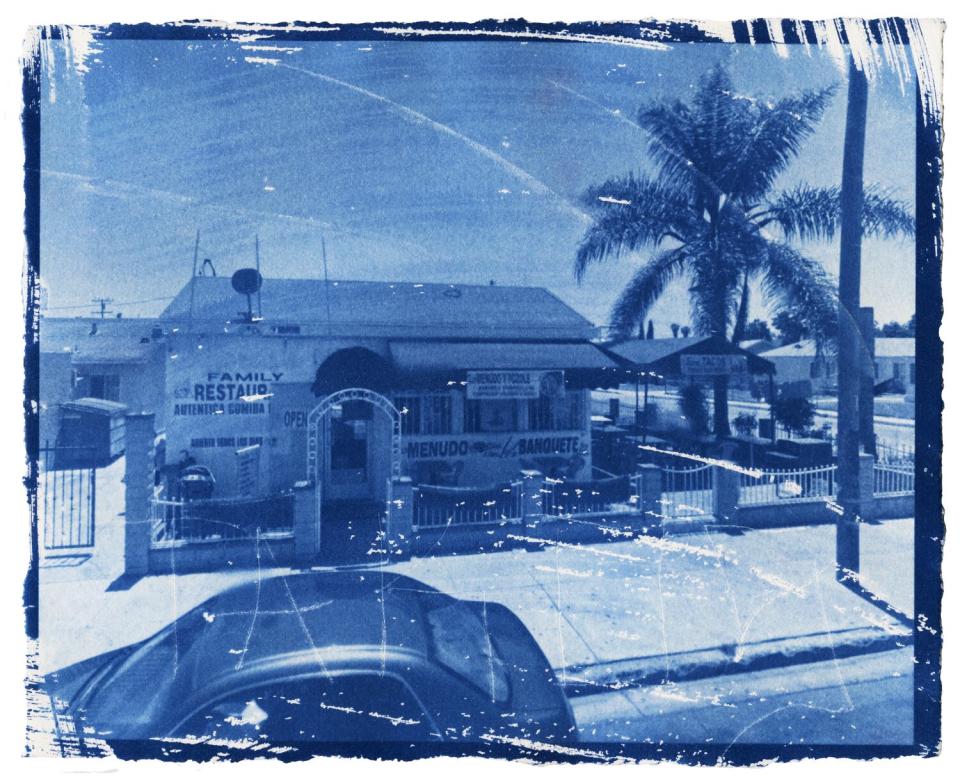The most intimate food experience in L.A. is happening at the crib

This story is part of Image Issue 15, “Diaspora,” a fantastic voyage through the mecca of food, from Hollywood haunts to mall food courts to L.A. staples. Read the whole issue here.
In L.A., there is an abundance of eateries that exist in private — out of a garage, or yard, or home kitchen. An underground food scene that you only know about if you’re lucky or loved. Should you be so fortunate to be invited inside as a guest, you'd find out firsthand how intimate a dining experience can be. Take Miguel and Angela, for example. You wouldn't know that behind their garage door lies a freezer with more than 20 homemade Oaxacan-style ice cream flavors: leche quemada, mezcal, mamey, nuez. In the back corner there’s a plancha where other Oaxacan specialties are prepared. It's the kind of space that can pretty much only be found through Instagram, word of mouth, blogs or maps. Recently, two people met outside the garage for a meal and conversation about this IYKYK L.A. food tradition.
Person 1: Lately, I've been feeling fatigued with eating in L.A. I'm a little bit jaded from going to some of these places. I have to drive. How many minutes to get there? Then find parking. I have to wade through the sea of people. I put my name down on the list. I've been saying out loud lately, “I just want good, simple food.” When I first moved here, I was so amazed with all the different kinds of restaurants and everything that was available to me. But I’ve been feeling jealous of my friends who can go home, to their parent’s house, and eat. Something like this, for me, hits that.
Person 2: When you look at the social, cultural and political context of eating in someone's home as a customer, it approximates, obviously, eating as someone who is invited. Right now, Miguel is bringing us this tlayuda, this memela, and we're sitting at this table with this flower pattern tablecloth, these little stools. And it does approximate that feeling of being invited into someone's home — although you're a customer, a diner, a stranger, there is a level of trust involved. It's something that is much more present and visible in this city than I think many, many others. Certainly more than an over-gentrified city like San Francisco or slightly over-regulated city like San Diego.
Person 1: Just being invited into someone's home, like you said, is such a special thing. And I feel like I'm at a quinceañera right now in a lot of ways. And I really like that. That's a very nostalgic, comfortable, exciting feeling.
Person 2: It’s one of the best feelings.
Person 1: Or even a backyard party. You always know that the food you get there…
Person 2: … Is going to be homemade and bomb. And there's nothing like homemade food. What a restaurant is trying to do is replicate this, replicate the home style experience as much as possible in a commercial space. Some people achieve it and get very close. Some restaurants fail miserably. But I think we just all want to feel comforted and taken care of, even through a plate. It reminds you of life in Mexico and Latin America. It's such a common thing. This is how people eat: outdoors, in their backyards, and their patio, in an alley space, on the sidewalk.
Person 1: I've been thinking a lot about this idea of exclusivity. I hate that word, it makes me cringe. But just for the sake of the conversation, that feeling …
Person 2: … That it’s a secret, that you have access.
Person 1: We all want some version of that. And what that looks like is going to be wildly different for a lot of different people. For some people, that might mean having the private room at a Michelin-starred restaurant, and for other people, for somebody like me or like you, that means being the only person eating in front of someone's garage in a big city.

Person 2: It’s a factor, for sure. Earlier this month, critic Bill Addison reviewed Seafood Underground 106, which is on 106th Street in Lennox/Inglewood. The man behind it ran the restaurant out of his backyard in the same place [he’d lived] for 30 years. It's a fantastic environment. There were palm trees, people bringing crates of beer on the low, the kitchen was in a little hut. It feels a little bit like a quinceañera, a little bit like a backyard during a game or a holiday. An exclusive thing. That combination of vibes [comes] when you achieve that balance, and I think that he really did. Then he gets reviewed in the L.A. Times — but he'd also been on multiple TV stations, all over TikTok — and the landperson of the property, L.A. Taco reported this, told him to stop. So he shuts down.
This organic, natural, tangential way that people find their clientele will happen, and then a rupture happens and the place is in trouble. The exclusivity vanishes, because it becomes too well known, becomes too mainstream. There can be tensions with neighbors, tensions with the local gangs over parking. So it's actually a very magical thing in that sense. If one [of these places] survives and thrives for very long, it's a very vulnerable thing. It's tenuous, and at any moment, it can be taken away. As consumers, as visitors and as people who are experiencing it, it poses a question and a challenge to us: How much do you want it? At what cost? Who would you bring here? Who would you not bring here?
Person 1: There’s a natural tension. Even something like going to an underground party in L.A., I think our [tendency] as humans is, “Wow, this is so cool. I want so many people to know about it. I need to tell everyone I went to this thing.” After you go to enough of these types of things, whether it's an underground party, whether it's somebody's home restaurant, I think you naturally do build up this [tolerance] of wanting to go to Instagram, or wanting to go to TikTok and be like, “Look where I'm at and where you're not.” After a while, I think you have to be OK with it just being about the experience.
Person 2: One hundred percent. With some of my homies I’m like, “I’m going to tell you this but please don’t blow it up.”
Person 1: Some might call it gatekeeping but I’m going to choose to not call it that [laughs].
Person 2: It’s being protective of something that you love.
Person 1: And I think understanding that when you're in these types of situations, you do get a chance to talk to the people who are cooking your food in a way that you otherwise maybe wouldn't. Having real conversations, and understanding why Miguel, for example, does this, how much he loved his mom. He said that how many times? I don't remember the last time I was at a restaurant and the chef told me how much they love their mom. I'm eating this food now and it feels different. I automatically have this connection toward him because, well, I love my mom too. There is this protectiveness that comes over me. I'm not going to tell everybody about this, because I don't know if everyone would have the same awareness of how special that is.
Person 2: There are too many people viewing experiences like a bank to deposit in. And that's it. Where they're just kind of collecting experiences fully from a consumer standpoint, and only to brag about them later. It's not just about collecting experiences — they're bringing something to the table, and you're bringing something to the table as well, even by eating here, by consuming, by sharing, by making this exchange. You're not just a passive eater, you are actually a very active participant in a social and mercantile exchange. It's similar to going to a yard sale, or a sample sale. You're at someone's house, you’re in someone's studio, a stylist, a designer, a collector. This is like a collection.
Person 1: Absolutely. And what are you bringing to the table? When you were describing people thinking of experiences as something to be checked off, shown off, and then moved on from, that is extremely common. I'm like, “Were you even there?” At its best, something like this should be an energy exchange. I’m curious if you think this feels like a quintessentially L.A. thing and why? (Obviously besides places like Latin America, where this is such a normal part of everyday life.)
Person 2: I do think that there's something in the DNA of L.A. that is reflected in this way — in eating in someone's backyard, in someone's driveway. It's something that we're proud of and that we really embrace. When the swings in government try to regulate or force codes that are in conflict with this kind of practice, we push back and we find a way. The people of the city defend themselves, we stand up for our vendors. The city will mobilize exactly at a moment's notice to protect people and this kind of practice when it is safe, when it’s community-focused, when it is providing service to direct neighbors, when it’s welcoming you as a guest.

Person 1: It’s also so in line with L.A.’s industrious spirit.
Person 2: I've always said that the real key, the only unifying quality of an Angeleno — well, I would say that there are two — is that everyone in this town works super, super, super hard. An L.A. native said this to me years ago and it stayed with me forever: L.A. is one of the most over-stereotyped cities that's ever existed. And the one that you least hear, and is the most true, is that everyone in this city is a f— hard a— worker. And number two, everyone in this city is a savant or expert on one very specific thing. Now that I think about it, this practice of backyard eating is a combination of those two very L.A. traits: the hustle and the expertise.
Person 1: I think that that's why I feel very lucky in a situation like this. That's the first word that comes to my mind when I ask myself, “How do I feel right now?” I feel very lucky, because when anyone can share anything that they geek out on so deeply, or that is a part of their culture, their heritage and I get to participate in it, even if it's not a part of mine, that, to me, is an irreplaceable experience.
More stories from Image
This story originally appeared in Los Angeles Times.

